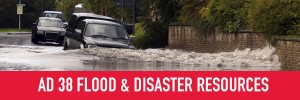There are several things one should do before, during and after a flood to create the safest possible environment.
Before a Flood
It is best to create a plan to evacuate your home or work quickly and safely. Double-check your existing home insurance policy to ensure the property is covered for flood damage.
Prepare an emergency kit with a first aid kit, food and drinking water, a battery operated radio, extra batteries, blankets, rain resistant or waterproof clothing and flashlights.
Stay notified of flood alerts and updates via the radio or social media.
Prepare your home before a flood hits if possible. Secure important documents and personal belongings, use sandbags around the property or home if necessary, and be ready to evacuate in advance.
During a Flood
Stay informed and monitor local radio and television, including NOAA Weather Radio, internet and social media for information and updates. Get to higher ground immediately.
If told to evacuate, do so immediately. Be sure to lock your home as you leave. If you have time, disconnect utilities and appliances.
Do not walk through flood waters. It only takes six inches of moving water to knock an adult over. If you are trapped by moving water, move to the highest possible point and call 911 for help.
Do not drive into flooded roadways or around a barricade; Turn Around, Don’t Drown! Twelve inches of water can float a car or small SUV and 18 inches of water can carry away large vehicles.
After a Flood
Stay tuned to your local news for updated information on road conditions.
Check with utility companies to find out when water, electricity, or gas services may be restored. Carbon monoxide poisoning is one of the leading causes of death after storms, when areas are dealing with power outages.
Avoid standing water; it could contain toxins, debris, or other dangers.
Do not visit disaster areas! Your presence may hamper rescue and other emergency operations.
Road closures and other cautionary signs are put in place for your safety. Pay attention to them!
Do not enter a flood damaged home or building until you’re given the all clear by authorities. Make sure the electrical system has been turned off, otherwise contact the power company or a qualified electrician.
Contact your insurance agent as soon as possible to discuss the damage done to your property. If you have a home generator, be sure to follow proper safety procedures for use.
Disasters can result in a significant financial loss. However, when a disaster strikes, government agencies are quick to respond. Citizens are quickly notified where to find a nearby Disaster Application Center, or DAC, where affected residents may apply for loans and grants.
These centers are also ideal locations to receive information regarding housing, employment, business, and other types of relief. Referrals are also made to numerous volunteer agencies that provide food, medical assistance, and shelter.
While DAC’s are an important resource, your family needs to know where to go for help. Depending on the type of disaster, you may need to contact local, state, or federal agencies to receive assistance with low-interest loans and cash grants, housing assistance, tax refunds and veteran’s benefits.
Make sure that you keep detailed notes and a log of all phone calls and correspondence with relief and other agencies. Make a note of, and hold onto, your disaster identification number if one is assigned to you. Remember to keep all documentation that is given to you.
Like this:
Like Loading...
Related





 Tweet This
Tweet This Facebook
Facebook Digg This
Digg This Bookmark
Bookmark Stumble
Stumble RSS
RSS


























REAL NAMES ONLY: All posters must use their real individual or business name. This applies equally to Twitter account holders who use a nickname.
0 Comments
You can be the first one to leave a comment.